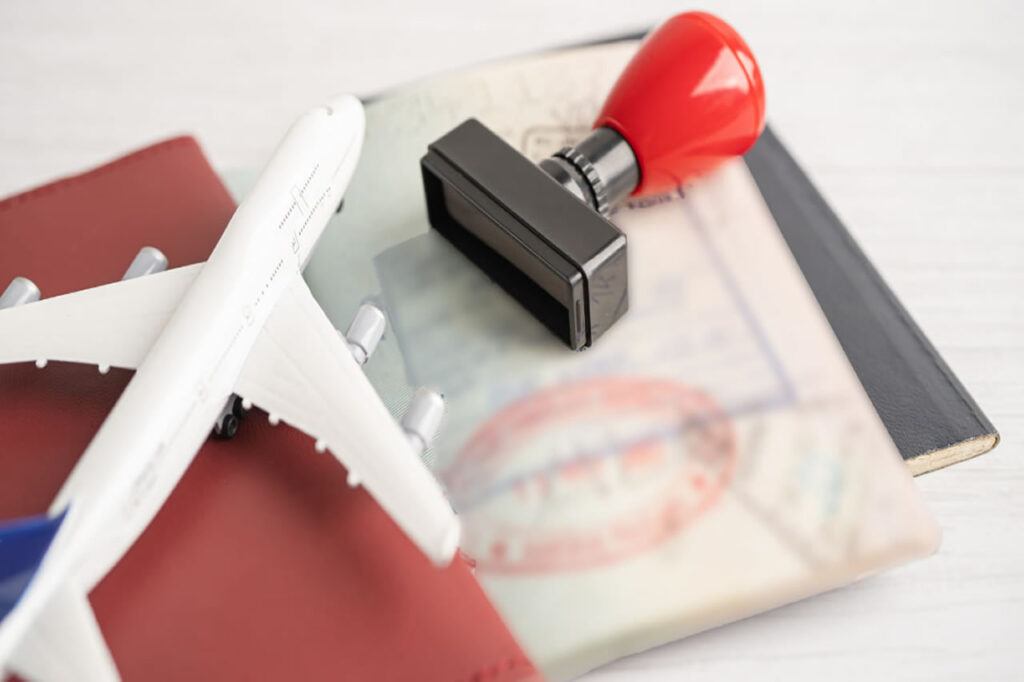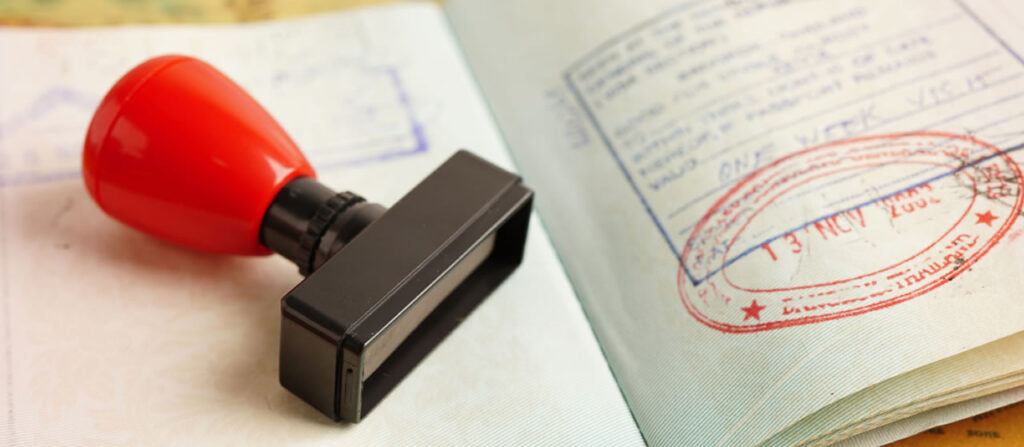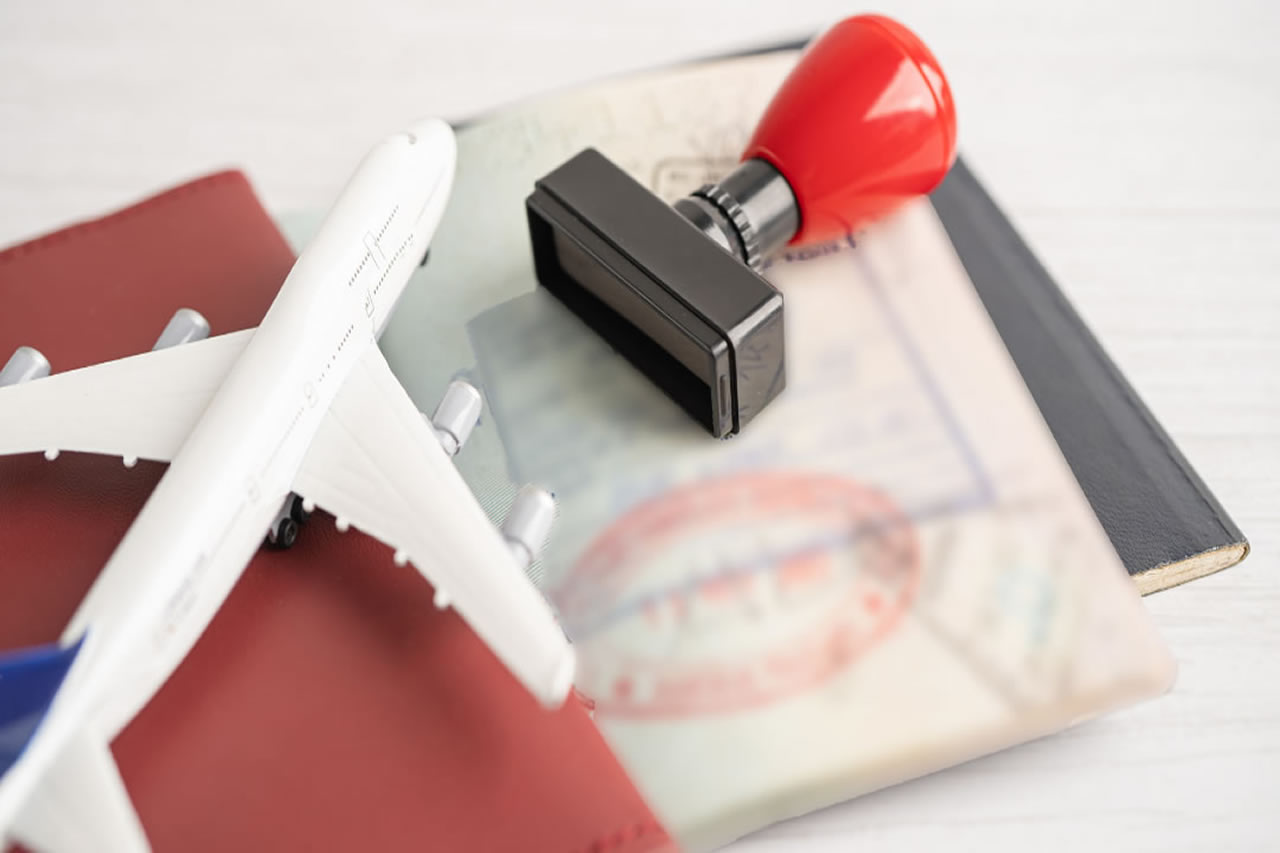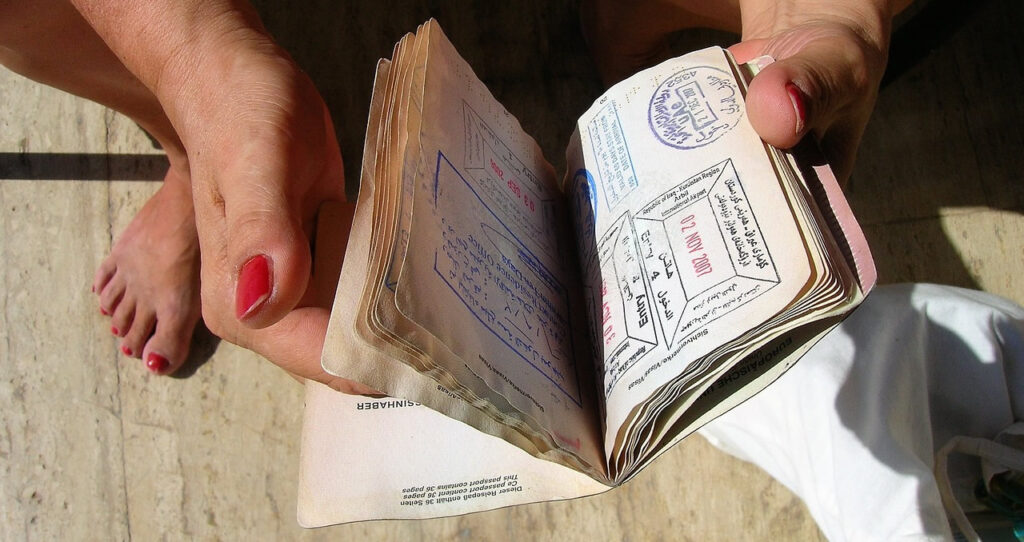Planning to stay in Thailand beyond the standard 30-day visa-exempt entry? The Tourist Visa (TR) is the clean, legal path to more time—choose a Single-Entry (SETV) for a focused 60 days (+30-day extension) or a Multiple-Entry (METV) for flexible trips over 6 months. This guide shows exactly how each option works, what it costs, who qualifies, and how to apply (including E-Visa). You’ll also get a simple extension checklist, onward-ticket tips to avoid airline refusals, and clear answers to common pitfalls like visa runs and overstays.
📌 Not sure which route fits your dates? Use the Visa Days Calculator and skim the Long-Term Visa Options overview.

Types of Tourist Visas
Visa Exemption (Visa-Free Entry)
Many nationalities can enter Thailand without a visa for a stay of 15 to 60 days, depending on their country of origin. Check with the Thai Embassy or Consulate in your home country for specific eligibility. Most 30-day visa-exempt entries can be extended once by 30 days at Immigration (1,900 THB), at officer discretion.
Single-Entry Tourist Visa (TR Visa)
Starting with the Single-Entry Tourist Visa (SETV), this option is perfect if you’re planning a one-off trip lasting up to 60 days. The visa itself is valid for 3 months from when it’s issued, but remember, once you enter Thailand, you’ve got a 60-day window for your stay.
- Valid for 60 days from the date of entry.
- Can be extended once for an additional 30 days at a Thai Immigration Office for 1,900 THB.
- Must be obtained before arriving in Thailand.
Multiple-Entry Tourist Visa (METV)
This visa is handy because it’s valid for 6 months and allows unlimited entries. Each time you enter, you can stay for up to 60 days. Plus, if you decide you need a bit more time in Thailand, you can extend your stay by 30 days while you’re there.
- Allows multiple entries over 6 months.
- Each stay is limited to 60 days but can be extended for 30 more days.
- Requires proof of financial stability (e.g., 200,000 THB in a bank account) and onward travel documents.
Tourist entry options (quick compare)
| Option | What you get | Best for |
|---|---|---|
| Visa Exemption (visa-free) | Entry stamp (typically 30 days for most nationalities), usually extendable once by +30 days at Immigration (1,900 THB) | Spontaneous trips & short stays |
| Single-Entry Tourist Visa (SETV) | 60 days on entry, extendable +30 days (1,900 THB); must use within 3 months of issuance | 6–9 week trips with fixed dates |
| Multiple-Entry Tourist Visa (METV) | Valid 6 months; each entry 60 days + extendable +30 days; requires stronger financial proof | Flexible multi-trip plans over 3–6 months |
📌 Note: Exact visa-free durations vary by nationality; always confirm with your local Thai Embassy/Consulate.
Visa Requirements
When it comes to paperwork, you’ll need to gather a fair bit of documentation. This includes a completed visa application form and a couple of passport photos. Your passport should have at least six months of validity left and enough blank pages.
If you’re applying from outside your home country, proof of residency is necessary. Also, be prepared to show travel confirmation like flight tickets and proof of where you’ll be staying such as a hotel booking or an invitation letter.
Financial proof (typical baselines): 20,000 THB per person / 40,000 THB per family (SETV/visa-exempt). Some embassies require stronger or sustained balances for METV (e.g., recent 6-month bank statements). Requirements vary by embassy/consulate.
Core documents (most cases):
• Passport valid 6+ months with blank pages
• Completed application + recent passport photos
• Proof of onward travel (exit flight or confirmed land exit)
• Accommodation proof (hotel bookings or invitation letter)
• Financial proof: typically 20,000 THB per person / 40,000 THB per family (post-specific)
• If applying in a third country: proof of legal stay/residency there
• Visa fee (varies by country & visa type)
📌 METV extra: some embassies require a sustained balance or regular income proof (e.g., the last 6 months bank statements).
🔎 Important: Financial thresholds and accepted documents vary by embassy/consulate. Always check your specific mission’s page (some accept only E-Visa submissions; others accept in-person).
✈️ Airline check-ins often require an onward ticket within your permitted stay. Use a refundable fare or a real onward booking; many carriers will not check you in without it—even if Immigration might have allowed discretion.
Cost: How much does a Thai Tourist Visa cost?
Visa fees are set by each Thai embassy/consulate and vary by country, currency, and application channel (in-person vs. E-Visa). Below are illustrative examples to help you budget—always confirm your fee with the specific embassy/consulate you’ll use.
- United States: $40 (SETV) · $200 (METV)
- United Kingdom: £30 (SETV) · £150 (METV)
Typical fees by country
| Country / Region | SETV (Single-Entry TR) | METV (Multiple-Entry TR) | Notes |
|---|---|---|---|
| United States | US$40 | US$200 | E-Visa available in most states; card payment only. |
| United Kingdom | £30 | £150 | Online application; upload docs; bring passport for stamping if requested. |
| EU (typical) | €35–€50 | €150–€180 | Varies by embassy; some require bank statements & onward ticket proof. |
| Australia | A$60–A$60+ | A$225–A$250 | E-Visa common; service/processing surcharges may apply. |
| Canada | CA$50–CA$60 | CA$225–CA$250 | Most posts accept online applications; allow for mailing time if required. |
| India | ₹2,500–₹3,500 | ₹10,000–₹12,000 | Often requires stronger financials for METV; check consulate list. |
| Singapore | S$50–S$60 | S$225–S$250 | Fast processing; appointment slots can fill in peak season. |
📌 Heads-up: These figures are typical ranges seen in 2025 and are for guidance only. Your exact fee may differ based on exchange rates, the post you apply through, and whether an E-Visa platform/service fee is added.
What’s included vs. extra
- Visa fee covers the visa itself (SETV or METV).
- Not included:
- 30-day extension fee in Thailand: ฿1,900 (cash at Immigration)
- Courier/postage (if mailing your passport)
- E-Visa platform or card fees (varies)
- Photo/printing costs for supporting documents
Quick cost tips
- Budget for one extension: Many travelers plan 60 + 30 days on an SETV; set aside ฿1,900.
- METV math: If you’ll enter 3+ times within 6 months, the METV often beats multiple SETVs on convenience (and sometimes total cost).
- Cards only online: E-Visa portals generally require credit/debit card; in-person posts may accept local bank drafts only.
- Fees are non-refundable: Apply with accurate dates/docs to avoid paying twice.
Where to Apply
You have a couple of choices: you can head to the nearest Thai embassy or consulate in your home or a third country. Some places even offer the convenience of online applications through the E-Visa system. Make sure to check the specific requirements of the embassy you’re dealing with, as some only accept online applications.
- Thai embassies or consulates abroad.
- E-Visa System (available for some nationalities, allowing online applications through official Thai government portals).
How to apply via Thai E-Visa (most nationalities):
- Create an account on the official E-Visa portal and select Tourist (TR).
- Upload passport bio page, photo, accommodation, onward ticket, and bank evidence (PDF).
- Pay the fee online and submit.
- Watch for emails; if they request more docs, respond within the deadline.
- When approved, you’ll receive an approval PDF—carry a printout (or save offline) for airline check-in and Thai Immigration.
📌 Processing times: ~5 business days in person; ~6–10 business days via E-Visa. Add mailing time if a post requires you to send your passport. Apply 2–3 weeks before travel.
✅ You can apply online here: Thai E-Visa Official Website
Extending Your Stay (30-day in-country extension)
Most visitors on visa-exempt entry or a Tourist Visa (SETV/METV) can extend their current permission once by 30 days at a Thai Immigration office for ฿1,900. Approval is discretionary but routine when the purpose is tourism.
Where & how it works
- Where to apply: Any provincial Immigration office (use the one for your current address; big-city branches can be busier).
- When to apply: 7–10 days before your current permission expires (earlier is fine).
- Processing time: Usually same day (30–90 minutes typical), but it can take longer in peak season.
- What you receive: A new stamp adding +30 days from your current expiry (not from the day you apply).
- Re-entry: If you leave Thailand after extending, your stay ends unless you have a valid re-entry permit. (Tourists rarely need one unless they plan a short side trip and return on the same visa.)
Who can extend (and common limits)
- Visa-exempt entrants: 30 → +30 (once).
- SETV holders: 60 → +30 (once per entry).
- METV holders: Each 60-day entry → +30 (once per entry; you can still leave/re-enter again while the METV is valid).
- Second extensions: Rare; usually denied unless there’s a valid humanitarian/medical reason with documentation.
- Overstay warning: Don’t cut it close—overstay fines are ฿500/day (up to ฿20,000) and can affect future entries.
What to bring (checklist)
- Passport (valid ≥6 months) + the current entry/visa stamp page
- TM.7 application form (filled & signed)
- Photo 4×6 cm (some offices take digital photos on-site)
- Proof of address in Thailand (hotel letter/booking, rental contract, or landlord letter)
- Fee ฿1,900 (cash)
- TM.6 card only if you still have one (many travelers don’t; that’s fine)
📌 Dress neatly, bring a pen, and carry 1–2 spare photos. Keep copies of passport bio page, current visa/stamp, and departure card (if any).
Common reasons for refusal (and fixes)
- Insufficient remaining passport validity → Renew or show you still have ≥6 months (some posts accept slightly less, but don’t rely on it).
- No proof of address → Ask your hotel/host for a stamped letter with dates and your passport number.
- Frequent prior extensions/visa runs → Be ready to show onward plans or a short explanation letter (tourism itinerary, flight out).
- Photo/spec mismatch → Use the office photo booth or nearby shop.
After the 30-day extension—your options
- Need more time?
- Tourism only: Exit and re-enter (visa-exempt, another SETV, or another METV entry if still valid).
- Staying long-term for a purpose (study, work, retire, marry): Apply for a suitable Non-Immigrant Visa (often from outside Thailand). Some categories can be converted in-country at Immigration with strong documentation—expect extra fees and processing time.
| Your situation | Best next step | Notes |
|---|---|---|
| Visa-exempt, 30 days left | Apply for 30-day extension (TM.7) | Gives you ~60 days total on one entry. |
| SETV (60 days) | Extend +30 at Immigration | Total up to ~90 days on that entry. |
| METV, still valid | Extend +30 now; later exit & re-enter for new 60 | Maximizes time without reapplying for a new visa. |
| Need >90 days, purpose-based | Switch to Non-Immigrant (ED, O, B, LTR) | Often requires applying **outside** Thailand. |
Quick FAQs
- Does the 30-day extension invalidate my visa?
No. It simply adds 30 days to the current stay. If you hold an METV, you can still do another entry later while it’s valid.
- Can I get a re-entry permit as a tourist?
Yes, but it’s rarely useful unless you must leave and return on the same visa entry (e.g., a short side trip after extending an SETV). Most tourists just exit and start a new entry.
- Can I extend again after the +30?
Usually no (one time only). Medical/humanitarian exceptions exist with documentation. Plan to exit or switch visa type.
Visa Runs & Border Crossings (what still works in 2025)
“Visa runs” = exiting Thailand and re-entering to start a new stay. They’re still possible, but Immigration scrutinizes repeat entries—especially by land. If you intend to stay longer, SETV/METV (or switching to a non-immigrant visa) is the safer path.
The current reality
- Land borders: typically max 2 visa-exempt entries per calendar year; repeat runs can be refused.
- Air entries: generally more lenient, but frequent back-to-back entries may trigger questions/refusal.
- SETV/METV holders: Re-entry on a valid visa is usually smoother than visa-exempt “stamp hopping.”
- Officer discretion rules: Purpose matters. A clear tourism plan, funds, and onward ticket help.
Before you go (checklist)
- Valid passport (≥6 months, blank pages).
- Proof of onward travel (flight/bus out of Thailand within permitted time).
- Accommodation proof (first few nights).
- Funds (cash/card statements if asked).
- Dress & demeanor: Be polite, concise, consistent with your “tourism” purpose.
📌 Time your run a few days before your current stay expires. Never cut it to the last day in case of delays or refusals.
TIT-style quick guide: choose the right move
| Your goal | Best option | Notes |
|---|---|---|
| Add ~30–60 days once | Do a **30-day extension** first; if needed, 1 **air re-entry** | Cheapest + avoids multiple land runs. |
| Stay several months with flexibility | Get an **METV**; exit/re-enter by **air** as needed | Each entry = 60 days + 30-day extension possible. |
| Living here long-term | Switch to **Non-Immigrant** (ED/O/B/LTR) | Stops the “tourist pattern” that flags officers. |
| Side trip while on SETV/METV | Use your **valid visa** to re-enter | No re-entry permit needed for tourist visas. |
Do’s & Don’ts at the border
Do
- Carry a credible itinerary (islands, national parks, internal flights).
- Keep prior entries reasonable for a “tourist.”
- Use airports for re-entry when possible.
Don’t
- Attempt multiple same-month land runs.
- Say you’re working remotely on a tourist entry.
- Argue. If refused, reroute (e.g., apply for SETV/METV or another visa).
Popular run patterns (examples)
- Bangkok ⇄ Kuala Lumpur/Singapore (air): clean re-entry with onward proof.
- Chiang Mai ⇄ Hanoi/KL (air): efficient and often inexpensive.
- Land runs to Cambodia/Laos/Myanmar: workable but higher refusal risk if repeated.
📌 Not ready to leave for long? Consider a 30-day extension first, then one air re-entry if you still need time. For the full playbook and route ideas, see the Thailand Visa Run Guide.

Common mistakes & refusals
Common pitfalls (and how to avoid them)
• Inconsistent documents (name/date mismatches, unclear bookings) → double-check everything.
• No onward proof → book a refundable outbound.
• Insufficient funds → bring statements that clearly show available balance.
• Serial visa runs or too many back-to-back entries → expect questions or refusal.
• Working on Tourist/Exempt → not allowed; if you plan to work remotely long-term, read the Destination Thailand Visa (DTV) guide.
Overstay: fines, bans, and how to handle it (2025)
Overstaying is taken seriously. Fines are 500 THB per day (capped at 20,000 THB). Paying the fine does not erase the immigration record—repeat patterns can hurt future entries or visa approvals.
What actually happens
- Voluntary exit (most common): Pay the fine at Immigration (in town) or at the airport land-side overstay desk before check-in. You’ll get a receipt + an “overstay” stamp in your passport.
- If you’re caught at a checkpoint or raid: Expect detention, transfer to the Immigration Detention Center, and deportation at your expense. This can trigger entry bans even for short overstays.
- Ban thresholds (guideline): Short, voluntary overstays usually no ban; prolonged or apprehended cases can lead to 1–10 year bans.
| Overstay length | Typical consequence | Notes |
|---|---|---|
| 1–7 days | 500 THB/day fine | Usually no ban if you exit voluntarily. |
| 8–40 days | Fine up to 20,000 THB | Record may affect future entries/visas. |
| > 40–90 days | Max fine; higher scrutiny | Risk of refusal on next entry increases. |
| > 90 days | Possible **1–10 year ban** | Severe if **apprehended** rather than self-reported. |
If you realize you’ve overstayed (do this)
- Exit ASAP. Don’t wait for the last day—go today if you can.
- Bring passport, cash for the fine, and your onward ticket.
- Arrive early at the airport; allow extra time (queues at the overstay desk).
- If you’re unwell or your passport is lost, go to Immigration in town with hospital/police documents.
Good to know
- Kids: Minors’ overstays are still recorded; officers may waive fines but not always.
- Weekends/holidays: Airport desks are usually open; some provincial offices are not.
- Receipts & stamps: Keep the fine receipt; future visa officers sometimes ask.
- Myth busting: Paying the fine doesn’t “reset” your record; frequent or long overstays can lead to future denials.
📌 Safer alternative: If you’re still in status, do a 30-day extension first. If you’ve already overstayed, exit cleanly and re-enter later on the right visa (SETV/METV or a non-immigrant category).
Converting a Tourist Visa (TR) to a Non-Immigrant Visa in Thailand (2025)
Yes, you can often change from TR to a Non-Immigrant category inside Thailand—but it’s not automatic and not every office will do every category. Aim to apply well before your current permission of stay expires (ideally with ≥15 days remaining).
How the in-country conversion works (overview)
- Choose the target category (Non-B, Non-ED, Non-O—marriage/retirement/guardian, etc.).
- Prepare supporting docs (see table + checklists below).
- Visit your local Immigration Office (some cases are routed to Bangkok/Chaeng Watthana).
- Pay fee (visa change fee typically 2,000 THB; separate 1,900 THB if/when you extend stay).
- Receive under-consideration stamp while they process; return for the final stamp or instructions.
📌 If your case is borderline (e.g., tight timing, incomplete docs), many people switch to SETV/METV first (from abroad) and then convert/extend in Thailand with more breathing room.
Common TR → Non-Immigrant paths
| Path | Core requirement (you bring) | What the office looks for |
|---|---|---|
| TR → Non-B (employment) | Job offer + employer dossier (company regs, tax docs), WP pre-approval/letter, contract | Genuine Thai employer, role suited to a foreigner, company capital & staff quota for work permit |
| TR → Non-ED (study) | Acceptance/enrolment letter, school license, timetable, proof of funds | Licensed institution, real attendance plan (language, degree, or approved program) |
| TR → Non-O (marriage) | Thai marriage certificate, spouse ID/house book, address proof, photos together, funds/income | Bona fide marriage, cohabitation, financial support sufficient for later extensions |
| TR → Non-O (retirement) | Age ≥50, Thai bank balance or pension income, Thai bank letter, address proof | Financials in place for subsequent 1-year extension (bank/ income evidence) |
| TR → Non-O (guardian/parent) | Child’s school docs, birth certificate, proof of custody, funds | Child enrolled; you are the legal guardian and financially responsible |
What to bring (base set)
- Passport (≥6 months validity) + copies of bio page, current entry stamp, and TM.6 (if issued).
- Recent photo (per local spec; many offices take digital photos on-site).
- Thai address proof (rental contract/house book + landlord ID copy if requested).
- Completed application form(s) (office provides; some accept online prefill).
- Fee: 2,000 THB (visa conversion) in cash; keep the receipt.
Plus per category (quick checklists)
Non-B (employment)
- Employer pack (company affidavit, list of shareholders, VAT/tax filings, location map, photos of premises).
- Job contract, position description, and work permit pre-approval/letter from Labour office (varies by province).
- Education/experience proofs (degree, transcripts, reference letters).
Non-ED (education)
- Acceptance/enrolment letter on school letterhead, school license/registration, timetable.
- Proof of tuition payment (or deposit), attendance plan, funds.
Non-O (marriage)
- Thai marriage certificate + copies, spouse Thai ID + tabien baan (house book).
- Photos at home together, map to residence, sometimes interview.
- Evidence of income/funds (helps with later 1-year extension).
Non-O (retirement)
- Age 50+, proof of funds (Thai bank balance or monthly pension as applicable).
- Thai bank letter confirming balance; passbook copies; address proof.
Non-O (guardian/parent)
- Child birth certificate, your relationship/custody documents.
- School enrolment confirmation + payment receipt; address proof.
📌 Heads-up: Some offices insist on applying from abroad for certain cases (or if your timing/docs are thin). If refused locally, the fallback is to apply for the correct Non-Immigrant visa at a Thai embassy/consulate and re-enter.
Timing & sequencing tips
- Apply with at least 15 days left on your current stay to allow for any re-visits.
- If you’ll later seek a 1-year extension, check the financial “seasoning” rules for that category and prepare early (e.g., funds in a Thai bank in your name).
- Keep photocopies of everything and write your phone number on the top page; it helps officers reach you.
After conversion: extensions & work permit
- Converting to Non-B is only step one—you still need the Work Permit issued, then the 1-year extension of stay based on employment.
- Non-O/Non-ED typically convert first, then apply for the longer extension (1 year) once all criteria are met.
📌 Bottom line: Conversions are doable if your documents are complete and timing is safe. When in doubt, use a reputable visa agent or lawyer—it’s usually worth it for first-timers.
Staying Updated on Visa Policies (2025+)
Thai visa rules do change—sometimes quietly at the ministry level, sometimes quickly at local offices. Treat any guide (including this one) as a starting point and verify before you fly.
What changes most often
- Entry lengths & exemption lists (some nationalities get temporary boosts/cuts)
- E-Visa availability & document formats (bank statements, photo specs, proof-of-funds wording)
- Extension evidence (financial “seasoning,” address proof, insurance requirements for certain categories)
- Border practice (frequency of visa-exempt land entries, scrutiny on frequent re-entries)
How to verify (in the right order)
- Thai Embassy/Consulate you’ll actually apply at (their page overrides generic advice).
- Royal Thai Embassy – E-Visa portal (if your country supports online applications).
- Thai Immigration Bureau (for in-country extensions/changes of status).
- If your case is non-standard, call/email the office you’ll visit and note the officer’s name/time.
Pro tips before you apply
- Match documents to the post: each embassy/consulate can ask for slightly different proofs.
- Screenshot & save the requirements page the day you apply and bring printouts—it helps if an officer queries something.
- Mind closures: Thai and local public holidays can delay processing; build in buffer days.
- Carry backups: extra photos, bank statements (last 6 months), address proofs, onward flight options.
- Frequent travelers: keep a simple log of your entries/exits; it helps at borders if questioned.
Red flags that should trigger a re-check
- You’ve had multiple back-to-back visa-exempt entries.
- You’re changing purpose (tourist → study/work/retirement) on short notice.
- Your funds/insurance sit right on the minimum thresholds.
- You’re relying on third-country applications (requirements can be stricter).
📌 Requirements are post-specific and time-sensitive. Confirm with the exact office you’ll use, keep printed proof of what they asked for, and leave yourself buffer time for surprises.
FAQs
📌 Can I apply for a Tourist Visa outside my home country?
Often yes—if you can show legal residence or long-stay status in that third country. Check that embassy’s rules first.
📌 Can I convert a Tourist Visa to a long-stay visa inside Thailand?
Sometimes—before your current permission expires and only if you meet the target visa’s criteria. Expect extra documents and a processing fee.
📌 Do I need travel insurance for a Tourist Visa?
Not always required, but strongly recommended. Private hospitals are excellent but expensive without cover.
| 📌 Looking for more visa help? |
|---|
| ✅ Thailand Visa Hub – Your central guide to all visa types, rules, and long-term options. |
| ✅ Visa Finder Tool – Answer a few quick questions and see which visa best fits your situation. |
| ✅ Visa Stay Calculator – Check expiry dates, 90-day reports, and plan visa runs with ease. |


